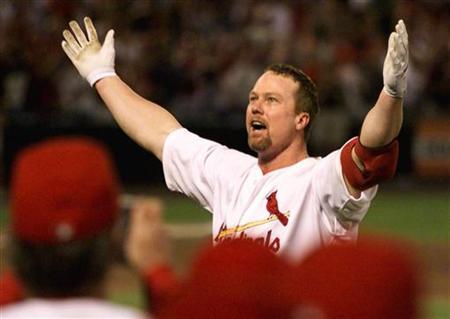Yes, we’re going there.
It won’t be pretty, and it will be controversial. But today, we’re going to dig into the case for Mark McGwire.
First, let’s get the introduction out of the way. Welcome to the newest edition of “The Cooperstown case”. It’s obvious whose case we’re going to look at, and why it’s a controversial one.
But for those who don’t know why, let’s just make one “minor detail” out in the open:
McGwire admitted to using steroids.
Now, many would end the discussion right here (and truth be told, I wouldn’t hold it against them), but there’s still more to it than that. As long as other steroid users remain on the ballot (and they will for years to come), then McGwire still has a case.
The true question is: is it a good case?
Let’s find out.
While he most famously played for the Cardinals, McGwire played a good portion of his career with the Oakland Athletics. In his rookie season (1987), he hit a rookie record 49 home runs, notched 161 hits and 118 RBI’s to go along with his .289 batting average. He was named the 1987 AL Rookie of the Year.
Over the course of his career, McGwire averaged a home run once every 10.61 at bats: Babe Ruth averaged a home run once every 11.76 at-bats.
In his 12-year career with Oakland, McGwire his 363 home runs, 941 RBI’s, doubled 195 times, and had a batting average of .260. But in addition, he walked 847 times and struck out 1043 batters.
On July 31st, 1997, McGwire was traded from the Athletics to the Cardinals, who were looking to boost their team after an untimely playoff exit in 1996. He immediately continued to make his presence felt. Despite playing just two-thirds of the season in the American League, he finished ninth in HR.
Following his trade to the Cardinals, he hit 24 more home runs. At the end of the season McGwire led the majors with 58 home runs in 1997. He also finished third in the major leagues in slugging percentage (.646), fourth in OPS (1.039), fifth in OPS+ (170), tenth in RBI (123), and ninth in walks (101).
But it was in 1998 where things began heating up more than ever.
Just a few years removed from their 1994 strike, MLB was looking for something to not only boost ratings, but gain interest from viewers of all ages.
Enter the home run chase.
McGwire of the Cardinals and Sammy Sosa of the Chicago Cubs battled it out during the entire season to chase Roger Maris‘ record of 61 home runs in a single season. While Mariners outfielder Ken Griffey Jr. was also in on the “home run chase” seeing a Cardinals and Cubs player battle it out for one of baseball’s most treasured records enticed millions to the TV screens.
History was finally made, as on September 8, 1998, McGwire hit a pitch by the Cubs’ Steve Trachsel over the left field wall for his 62nd home run. Busch Stadium went absolutely wild. Since the game was against the Cubs, Sosa was able to congratulate McGwire up in person. He finished the season with 70 home runs.
After 16 seasons, McGwire’s career numbers were as follows:
McGwire said in a statement sent to The Associated Press for nearly a decade, he had used steroids.
- Games: 1,874
- At-bats: 6,187
- Runs: 1,167
- Hits: 1,626
- Doubles: 252
- Triples: 6
- HR: 583
- RBI: 1,414
- BB: 1,317
- IBB: 150
- HBP: 75
- Strikeouts: 1,596
- SBs: 12
- CS: 8
- BA: .263
- OBP: .394
- SLG: .588
- OPS: .982
- OPS+: 162
For years, he was silent about steroid talk and anything close to the subject.
Until 2010.
At that time, he told Bob Costas that studying pitchers and making his swing shorter led to his increase in home runs and that he could’ve hit them without PEDs.
“I truly believe so,” McGwire said. “I believe I was given this gift. The only reason I took steroids was for health purposes.”
“It’s very emotional, it’s telling family members, friends and coaches, you know, it’s former teammates to try to get ahold of, you know, that I’m coming clean and being honest,” he said. “It’s the first time they’ve ever heard me, you know, talk about this. I hid it from everybody.”
He had become hitting coach for the Cardinals around the same time, and naturally, it had a big impact on his Hall of Fame candidacy. Players such as Barry Bonds, Roger Clemens, and more are still on the ballot, while players such as Rafael Palmeiro and McGwire are no longer on the ballot for Cooperstown.
Steroid usage and subsequent inquires have become more public as years have passed, and it tarnishes the legacies of many who otherwise would have a good case for getting into the Hall of Fame.
So, despite all the records McGwire broke, all the home runs he hit, and all the smiles he put on people’s faces, does McGwire deserve to be in Cooperstown?
Let the discussion begin…
Join us next Sunday, for the special 10th edition of “The Cooperstown case”!


